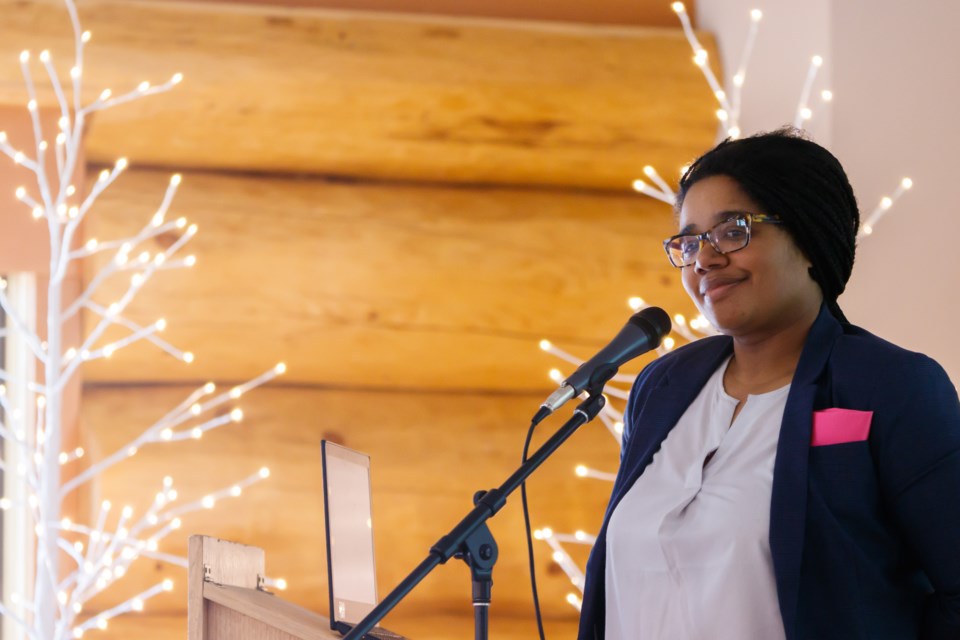CANMORE – On Dec. 6, 1989, a lone gunman opened fire at the Montréal post-secondary École Polytechnique killing 14 women.
In his suicide note, the shooter declared his actions were against women and the role they played in ruining his life.
“He talked about how he was fighting feminism,” said YWCA Banff Chief Executive Officer Connie MacDonald. “He blamed feminism for ruining his life.”
To this day many women, girls and LGBTQ+ individuals continue to face violence on a daily basis, MacDonald said, adding that starting conversations in communities like Canmore allows change to take root fostering a culture that can end gender-based violence.
Calling for action to bring an end to gender-based violence, the YWCA Banff held its Awareness to Action Luncheon in honour of the National Day of Remembrance and Action on Violence Against Women at the Canmore Opera House on Thursday (Dec. 5).
“This day is about honouring those who have faced gender-based violence, and it is also a time to take action,” she said. “We all have a role to play in creating a culture of respect and by taking meaningful action, so these kinds of tragedies don’t happen again in the future.”
It will take meaningful actions and years of work to make a difference with help from all genders, MacDonald said, but it is possible to create a better future.
The YWCA sees survivors of domestic violence throughout the year and the luncheon served as an opportunity to reflect, raise awareness and encourage action to prevent cases of gender-based violence in the future.
MacDonald cited the recently released data report from the Alberta Council of Women’s Shelters that indicated the province has one of the highest rates of domestic violence in the country. She added that nearly two-thirds of women accessing shelters in Alberta to escape violent partners face a severe or extreme risk of being murdered – the highest level of risk seen in eight years.
The YWCA Banff hosted 44 clients in its women’s shelter last year, 30 through out-reach counselling and 21 children, MacDonald said, adding that the organization had to turn away 35 women and 26 children because they did not have the capacity to accept them based on their needs.
She added that local police and victim services are seeing rates of domestic violence incidents increase in the area.
“We love to think that in the Bow Valley we are in a bubble,” she said. “We really are no different than what’s happening across the province."
To help unpack gender-based violence and encourage the pursuit of solutions, YW Calgary director of program operations Lana Bentley spoke during the luncheon.
“All forms of violence are unacceptable and are demeaning both to the person perpetrating and the person who is being victimized,” Bentley said. “The challenge in understanding domestic violence is that most of what we know about domestic violence is what shows in the shelter.”
Many people who experience acts of violence do not step forward, Bentley said, adding that these groups will not interact with a shelter and cannot be included within data analysis.
There are three different kinds of domestic violence, Bentley said, adding that the most lethal kind, intimate partner terrorism, largely sees an imbalance of gender in terms of victims.
“These folks need the service of emergency shelters because that is a lifesaving intervention.”
Bentley added that other types of domestic violence include the situation of violence where the experience is momentary and mutually-combative couples.
While domestic violence is traditionally examined through the lense of people who visit shelters, this view does not take into account the many people who have the social or economic resources that allow them to seek help outside of shelters.
“The challenge is when you talk about gender parity around perpetration when it comes to the most meaningful forms of violence in relationships men do tend to disproportionately be the perpetrator,” she said. “When, however, you’re looking at all acts of violence, be it emotional, psychological or financial, women and men are about equal in terms of their perpetration.”
While talking about the scope of gender-based violence it is important to have a conversation and "call it by its name" because doing so highlights contexts where women are being treated as less, Bentley said, while showcasing why change is needed.
By having these conversations steps can be taken to understand why gender-based violence occurs, Bentley said, which has the potential to lead to meaningful change.
She added that it can be a challenging dialogue unpacking gender-based violence because people can be scared to name the action, or fear judgment for saying the wrong thing.
Each community needs to unpack how to make domestic violence an act so offensive it is inconceivable, Bentley said. She added a key aspect of this conversation is education to ensure people are able to recognize when their behaviour is inappropriate.
Organizations like the Y can play an important role in creating the space for this change to take place, she said, while they support victims of gender-based violence.
Bentley called on audience members to work on becoming allies to marginalized groups and place pressure on all forms of government to ensure that all members of society are able to feel safe.
“If we’re not talking about ‘it’ as uncomfortable as it is,” she said. “How can we generate solutions?”




